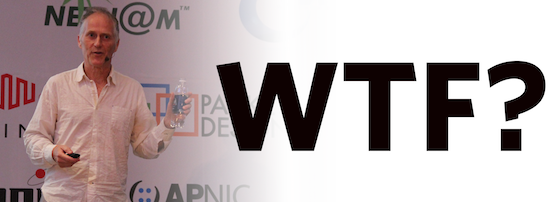
When looking towards the future, it’s always worth remembering from where we came. This fact was not lost on me as I sat in the crowd listening to Tim O’Reilly’s keynote presentation at APRICOT 2017 earlier this year.
Like many in the room, I learnt so much of what I know about networking from O’Reilly’s books – I still have a bat-tered copy of the sendmail book, as well as books on UUCP and Perl, to remind me of the days gone by.
For someone who brought us those books, his leap of faith into digital is profound.
During his presentation, he recounted his experience heading to Ho Chi Minh City for the conference: he asked Alexa for the flight status, then ordered a rideshare via an app on his phone, checked-in online en route, and arrived at the airport with a digital boarding pass. This would not have been too dissimilar to most of our own experiences, except maybe asking Siri, Cortana, or ‘ok Google’ depending on our OS preference.
If we go back 20 years, he would have called the airline for a flight status, then a taxi company for a car. Ten years ago, the Internet would have replaced the airline phone operator, but we’d still call for a taxi.
So, what happened to those phone operators and taxi companies? Is their unpopularity a sign of the future – or even present – where algorithms and machines replace people, particularly when it comes to repetitive tasks?
Your perspective will drive your answer. Tim’s perspective is that humankind will always have things to do as long as there are problems to solve. In fact, he views all of us as managers – line managers of the apps that do the job.
I, for one, agree that we’ll be the designers and architects, and the algorithms will do the building. You can already see the change by looking at the number of new types of jobs that have been created in our generation and older jobs that have disappeared – I remember about five years ago, in Nepal, a friend of mine put ‘web developer’ as the occupation in his passport application and had to convince the officials to have it accepted as a ‘real job’.
Artificial Intelligence covers a lot of similar topics too.
I personally think AI, as envisioned in science fiction, is still another generation away. However, it’s surprising how much it already permeates our daily lives. I’m sure that some children may not even realize what they think is normal is actually pretty advanced. For example, predictive playlists on Spotify sounds simple, but there is a large dataset and analysis that drives those.
My question is whether governments are ready for this change? Are higher level changes to policy and governance going to be as simple or do we start educating our policy makers?
Tim called it ‘regulation in the age of algorithms’. I personally think the policy development process and the overall bottom-up approach favoured by the Internet community at the IETFs and the RIRs has worked quite well. Which is why helping governments is going to be the next big challenge for us as an industry.
Going back to Tim’s pre-flight experience, it’s very likely that Tim could just walk to security when he checked-in, as he was flying internationally – someone from the airline would have verified that he had the correct paperwork to arrive in Viet Nam and not get turned away. Maybe another decade, and that step gets automated, with airline staff only needed for the most complex of trips. We can only wait and see what the future brings, as Tim said – the 21st-century books are about infrastructure code.
Tim’s talk was wide ranging, and for those who missed APRICOT, the recording of his keynote along with loads of other interesting talks are available online.
The views expressed by the authors of this blog are their own and do not necessarily reflect the views of APNIC. Please note a Code of Conduct applies to this blog.
